Synposis of the Women in Cancer Research Mini Seminar Series

In March and April of 2019, the PS-OC hosted four women researchers in a Women in Cancer Research Mini Seminar Series.
Natalie Artzi – Brigham and Women’s Hospital, and MIT’s Institute for Medical Engineering & Science
“Adaptable Biomaterials for Combination Cancer Therapy.”
Natalie Artzi described nanoparticle systemic delivery combinations with local delivery to improve outcomes, enhance tumor shrinkage, and prevent recurrence, in a colon cancer model. By crosslinking nanoparticles to form an injectable adhesive hydrogel, therapeutics can be released in a controlled- and selective-manner.
She also discussed treating solid tumors with nanoparticle designs that can provide selective drug uptake in cancer cells while leaving healthy cells intact. The benefits of multimodal combination therapy—drug release, gene therapy, and thermal ablation—to treat solid tumors, and the opportunities to combine cancer immunotherapy to achieve robust and long-lasting responses, was also highlighted.
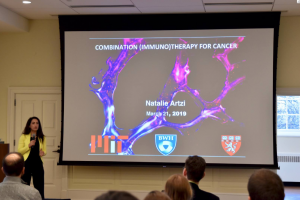
Daniele Gilkes – Physical Sciences-Oncology Center, Institute for NanoBioTechnology, and Johns Hopkins Medicine
“Hypoxia and Breast Cancer Metastasis.”
Hypoxia is required for development and detrimental in cancer. Daniele Gilkes discussed her team’s novel approach to fate-map hypoxic cells to determine their cellular response to physiological O2 gradients. They demonstrated the system’s ability to fate-map hypoxic cells in 2D, in 3D spheroids and organoids using in vitro models, and in orthotopic and autochthonous mouse models of breast cancer, showing for the first time that post-hypoxic tumor cells can successfully establish metastasis at distant sites. Distinct gene expression patterns were identified in cells that experienced intratumoral hypoxia in vivo as compared to cells exposed to hypoxia in vitro. The intratumoral hypoxia gene signature was a better prognostic indicator for distant metastasis free survival than the in vitro hypoxia gene signature.
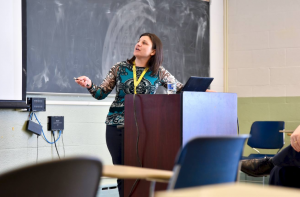
Stavroula Sofou -Institute for NanoBioTechnology and Whiting School of Engineering
“Impenetrable Tumors and Untargetable Cancers: Engineering Nanocarrier Surfaces to do the (apparently) Impossible.”
Stavroula Sofou’s team research uses model lipid membranes in the form of vesicles to study phase transitions; the goal is to use phase separated lipid domains to direct the vesicles’ surface topography and functionality, and the vesicles’ membrane permeability and fusogenicity. Integration of these processes on nanometer-sized lipid vesicles used as drug delivery carriers may precisely control their interactions with diseased cells increasing therapeutic efficacy while minimizing toxicities.
Examples of improving the therapeutic potential in chemotherapy and alpha-particle radiotherapy will be presented using vesicles that bind SINGLE cell surface receptors, and engineered approaches to overcome transport limitations in solid tumors.
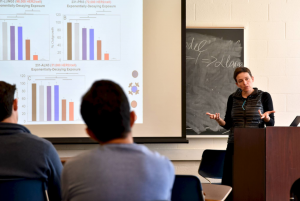
Karen Eisinger – Physical Sciences-Oncology Center, University of Pennsylvania Perelman School of Medicine
“New Approach to Metastasis Using a Novel Zebrafish Xenograft System”
About 90% of cancer deaths occur because of metastasis. Moreover, targeted therapies are unavailable to treat or prevent metastatic progression. Karin Eisinger’s group incorporated a novel in vivo approach in metastatic sarcoma utilizing the fli:GFP zebrafish xenograft system. They microinject fluorescently labeled sarcoma cells into the yolk sac of 2 day old embryos, which possess GFP+ vasculature. They observed that metastasizing sarcoma cells first form linear clusters, then extravasate and establish micrometastases.
Her team’s work focuses on soft tissue sarcomas but the zebrafish xenograft tool has a broad basis of utility and may be applicable to many different tumor types. They have found that cell lines derived from human lung, breast, and bone tumors can be evaluated using this system.
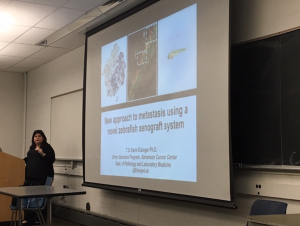
Story by Gina Wadas
Latest Posts
-
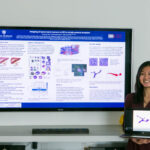 Q&A with PSON Intern Jocelyn Hsu
August 19, 2021
Q&A with PSON Intern Jocelyn Hsu
August 19, 2021
-
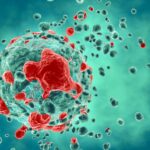 Start Up Founders from Johns Hopkins Aim to Stop Spread of Cancer
August 3, 2021
Start Up Founders from Johns Hopkins Aim to Stop Spread of Cancer
August 3, 2021
-
 Protein Appears to Prevent Tumor Cells from Spreading Via Blood Vessels
July 15, 2021
Protein Appears to Prevent Tumor Cells from Spreading Via Blood Vessels
July 15, 2021


